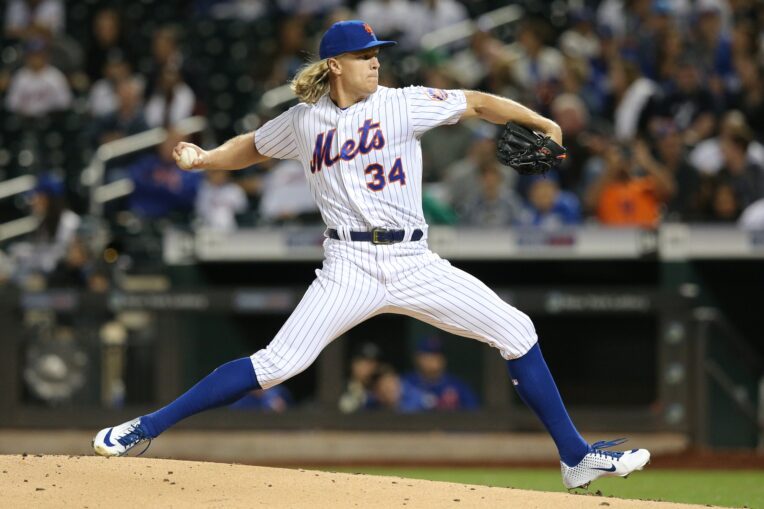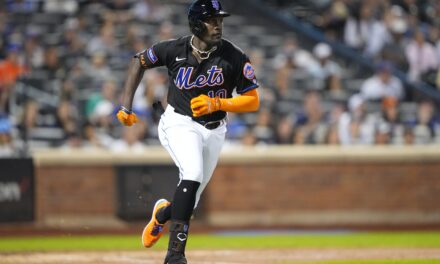
With the Mets’ playoff hopes hanging by a thread at the outset of a three-game series with the Los Angeles Dodgers, it was already crucial enough that Noah Syndergaard turn in a crisp start in yesterday’s opener. Considering it was his first start since reports of his frustration pitching to backstop Wilson Ramos had been leaked, the righty may have had even more to prove than just his team’s legitimacy.
Ultimately, however, after a 9-2 drubbing in which he only lasted five innings on four runs, five hits, and two walks, Syndergaard has left the team and its fans at a crossroads. This is the third time in the last four starts that he’s started a game against a team battling with New York for a playoff spot, and it’s the third such time he’s failed to make it to the sixth inning.
Syndergaard has allowed five homers over this 20-inning sample, though it’s worth noting that his one outlier – a seven-inning, no-run, ten-strikeout Labor Day showing against the Washington Nationals – came with Rene Rivera behind the plate. What’s more, his work with team backup Tomas Nido has yielded a 2.45 ERA, a figure less than half that of his current 5.20 figure with Ramos.
In fairness to both Syndergaard and Ramos, the first three innings of last night’s loss, though requiring 52 pitches, were far more appealing than the final line suggests. The righty allowed just two hits – one a shift-beating chopper off the bat of Joc Pederson – while notching all four of his strikeouts, including an eight-pitch finish of MVP frontrunner Cody Bellinger. His 97-99 mph fastball appeared to have that same dastardly sink, and he looked confident enough in his changeup to keep the Dodgers under his thumb.
As it’s been on a handful of occasions the last two years, failure to swiftly end at-bats possibly foreshadowed the mess that unfolded in the fourth inning. Despite retiring most of them, Syndergaard worked as many at-bats through six or more pitches as he did at-bats of four or fewer. A lineup as formidable as that of Los Angeles surely benefitted from seeing more pitches early in the ballgame, and the results as the order turned into the fourth can attest that.
The frame began with a Matt Beaty groundout, but Syndergaard proceeded to walk Bellinger in a ten-pitch showdown in which he’d been ahead 0-2. A pair of fastballs up and in evened it out, with Bellinger taking a low changeup and wasting two more on the lower third to work the count full. A pair of fouls on a curveball and fastball set up another fastball middle-in, this one barely missing the zone and putting the center fielder on base.
Corey Seager promptly knocked a single into right on a hit-and-run play to put runners on the corners, and A.J. Pollock tapped a 1-2 slider past the middle of the diamond to plate a run and even the score at one apiece. Syndergaard had shoved his way into a pitcher’s count after getting a wave and miss at his best slider of the evening, but just couldn’t replicate his next offering, leaving it higher along the outside corner.
Low sliders missing their spots is a trend that has impeded several Met pitchers’ work with Ramos this season, and considering his -13 DRS is the second-worst among big-league catchers (min. 750 innings), the concerns that he can successfully block are certainly valid. The next at-bat against rookie second baseman Gavin Lux, however, can be pinned much less definitively on the backstop. Syndergaard wasted no time falling behind the lefty 3-0 before inching back with two fastballs in the zone (one called, one fouled) to run the count full.
Lux then hit a hanging curveball off the over-wall in center field for a three-run homer – the first longball of his career – to give the Dodgers a 4-1 lead that would stick. Ramos had called for the curveball, an offspeed pitch Syndergaard hasn’t used for strikeouts nearly as frequently as either his slider or changeup.

Now at 78 pitches with only one out in the fourth inning, the air in Syndergaard’s balloon had been let out. He recorded two groundouts on seven pitches to avoid further embarrassment, and actually ended on a positive note in the fifth, working around a one-out walk and two-out steal with Bellinger at the plate. Syndergaard worked ahead 1-2 before inducing a lazy flyout to left and finish the night at 102 pitches (64 for strikes).
“I thought Wilson called a really good game,” Syndergaard began in his clubhouse interview following the loss. “Just wish I had that one pitch back. My pitch count got quite a bit elevated early in the game. They’re a good offensive team, and they know what they’re doing at the dish making me work out there… Just a bit of me, a bit of them being aggressive and spoiling good pitches.”
With regards to his level of comfort throwing to Ramos, Syndergaard kept his reviews positive, perhaps in light of the team’s bullish decisions to continue pairing the two against a situation that has hurt his image more than anyone else’s:
“Really, it’s just me getting comfortable out there on the mound, which I think I did a pretty decent job at, and we were really meshing and flowing out there,” Syndergaard said. “It was a step in the right direction, and that’s building a strong relationship. I look forward to more outings with him… we need his bat in the lineup.”
The righty has made the right call in downplaying whatever rift his leaked conversation might have caused, though it’s worth noting that Ramos himself did not stick around to answer questions following the game, and Syndergaard has yet to apologize to him on the grounds that he, in his words, wasn’t really anticipating leaked information getting out.”
“I thought they did fine. It seemed like the rhythm was good. Except for two pitches, it seemed to work out pretty good,” manager Mickey Callaway said. “I’m sure Noah would like to have those two pitches back, and those three at-bats of Bellinger’s where he’s fouling tough pitches off. Those were probably some of the best pitches he threw all night.”
The Mets are three games behind the Chicago Cubs for a second Wild Card spot with 15 games to play and two more teams to hurdle. Needless to say, every game counts perhaps more than it ever has, and the team is going to need to optimize every lineup they put out in order to win each time out.
Considering Syndergaard has been a part of each of New York’s last two playoff teams and has still worked to a 3.39 ERA since the All-Star break, getting the best starts out of him deserves consideration. Having Ramos’ bat in the lineup last night, as the case has been in many of the battery’s starts, couldn’t outweigh what unfolded on the other side of the scoreboard.














